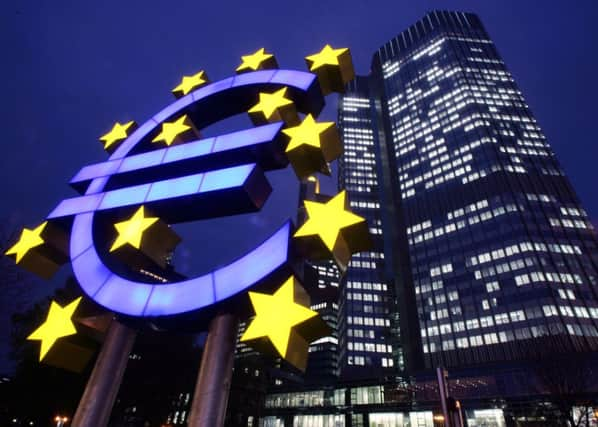COMMENT: Eurozone plans | sterling fall-out


ECB boss Mario Draghi also announced the central bank would launch a new round of bond purchases (including mortgage bonds) to pump liquidity directly into the stalled eurozone economy. Citigroup analysts immediately dubbed the plan as “turbo-charged QE”.
Only… it’s not. Far from engaging in QE, the ECB patently intends to re-boot the European economy by engineering a massive devaluation of the currency. Only drawback: that is in conflict with everyone else’s plans to do the same thing. It will also scare the stuffing out of America, which is on the brink of raising interest rates, thereby making the dollar more expensive. In other words, the ECB has ignited a global currency war that will pit the eurozone against America and Japan, leaving the UK to pick sides.
Advertisement
Hide AdAdvertisement
Hide AdOf course, Draghi would dearly love the ECB to follow the Americans, Brits and (latterly) the Japanese into quantitative easing. Since the crash of 2008, this exercise in printing money to buy bonds has staved off deflation in the Anglo-Saxon economies, reversed two decades of deflation in Japan, and manufactured an asset bubble that bought time for the real economy to start to recover.
But stern German fiscal tutelage has prevented the ECB from embarking on full QE. So Thursday’s ECB liquidity boost was more smoke and mirrors than reality. Draghi is not giving away entirely free money. True, he is lending it to commercial banks at near zero cost but (to keep the Bundesbank sweet) these banks must also post collateral. So any direct market stimulus is limited.
Clever Draghi has other fish to fry: devaluing the euro.
The euro hit a 14-month low of $1.30 against the dollar immediately after the ECB announcement. Yet I doubt if a rise in eurozone exports will compensate for falling prices inside Europe itself, which is killing domestic demand.
In the four months from March to July, prices in Italy fell by 1.6 per cent (annualised), in Spain by 1 per cent, and in France by 0.4 per cent.
Europe needs a massive injection of demand directly into the shops and factories.
Treasury’s savoir faire is a little strained
IS THERE anyone in at the UK Treasury or are they all at their holiday homes in Tuscany? On Tuesday sterling dropped 0.6 per cent against the dollar, ostensibly in reaction to a jump in support for Scottish independence.
Actually, the US dollar is surging on its own account. If the markets were having jitters about a Scexit, this might have more to do with the classic “Sir Humphrey” reaction of Sir Nicholas Macpherson, Permanent Secretary at the Treasury.
Another Eton and Balliol man, Macpherson blithely admitted that he has made no contingency plans for a Yes outcome.
Advertisement
Hide AdAdvertisement
Hide AdMy indy quote of the week comes from Bill O’Neill, UK boss of UBS Wealth Management, who declared that Scottish self-government would present investors with “unfathomable levels of uncertainty”. Unfathomable? Yes there are risks involved. But this is language more suited to a Brexit or a full Russia-Ukraine war than a small democratic European nation seeking self-government.